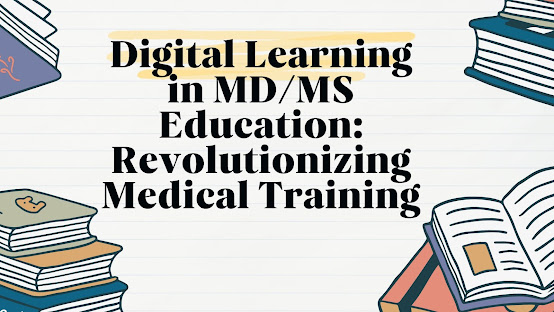Digital Learning in MD/MS Education: Revolutionizing Medical Training
- Get link
- X
- Other Apps
In recent years, digital learning has become a cornerstone of modern education, and its impact on MD/MS programs has been nothing short of transformative. As medical education evolves, digital platforms are playing an increasingly critical role in shaping the future of healthcare professionals. This article explores how digital learning is revolutionizing MD/MS education, enhancing the learning experience, and preparing future doctors for the challenges of a rapidly changing medical landscape.
1. Accessibility and Flexibility
Digital learning has made medical education more accessible than ever before. With online platforms, students can access a wealth of resources, including lectures, study materials, and interactive modules, from anywhere in the world. This flexibility is particularly beneficial for MD/MS students, who often juggle demanding clinical rotations with their studies. Online learning platforms allow them to manage their time effectively, enabling them to study at their own pace and revisit complex topics as needed.
2. Interactive Learning Tools
One of the most significant advantages of digital learning is the ability to incorporate interactive tools into the curriculum. Virtual simulations, 3D anatomy models, and augmented reality (AR) experiences offer students a hands-on approach to learning that traditional textbooks cannot provide. These tools enhance comprehension and retention by allowing students to engage actively with the material. For example, virtual dissections enable students to explore human anatomy in detail, offering a level of understanding that was previously only achievable in a physical lab setting.
3. Personalized Learning Experience
Digital learning platforms often incorporate adaptive learning technologies, which tailor educational content to the individual needs of each student. In MD/MS programs, this means that students can focus on areas where they need the most improvement. For instance, if a student struggles with a particular medical concept, the platform can offer additional resources, quizzes, and practice scenarios to reinforce their understanding. This personalized approach ensures that students are better prepared for exams and clinical practice.
4. Collaboration and Networking
Despite the shift to online learning, collaboration remains a crucial aspect of medical education. Digital platforms facilitate communication and collaboration among students and faculty through discussion forums, virtual study groups, and live video conferences. These tools allow students to share knowledge, discuss case studies, and engage in peer learning, which is essential for developing critical thinking and problem-solving skills. Additionally, digital learning enables students to connect with experts and peers from around the globe, broadening their professional network and exposing them to diverse perspectives in medicine.
5. Continuous Learning and Professional Development
The medical field is constantly evolving, and staying up-to-date with the latest advancements is vital for any healthcare professional. Digital learning platforms offer MD/MS students and graduates the opportunity to engage in continuous learning and professional development. Through online courses, webinars, and e-learning modules, doctors can acquire new skills, stay informed about emerging medical trends, and maintain their competencies throughout their careers.
6. Challenges and Considerations
While digital learning offers numerous benefits, it also presents challenges that need to be addressed. For instance, the reliance on technology requires a stable internet connection and access to suitable devices, which may not be available to all students. Additionally, the shift to online education necessitates a change in teaching methodologies, requiring instructors to develop new skills in digital pedagogy. Finally, there is a need to ensure that the quality of education delivered through digital platforms meets the rigorous standards required for medical training.
7. The Future of MD/MS Education
As digital learning continues to advance, it is likely to become an integral part of MD/MS education. The ongoing integration of artificial intelligence (AI), machine learning, and big data into medical education will further enhance the ability to personalize learning experiences, predict student outcomes, and improve the overall quality of education. Moreover, the use of telemedicine and digital health tools in clinical training will prepare students for the future of healthcare, where technology plays a central role in patient care.
Conclusion
Digital learning is reshaping MD/MS education by making it more accessible, interactive, and personalized. As medical education continues to evolve, embracing digital tools and technologies will be essential in training the next generation of doctors. While challenges remain, the potential benefits of digital learning in MD/MS programs are immense, offering a more flexible, efficient, and effective approach to medical education that will ultimately lead to better patient care and outcome
- Get link
- X
- Other Apps



Comments
Post a Comment